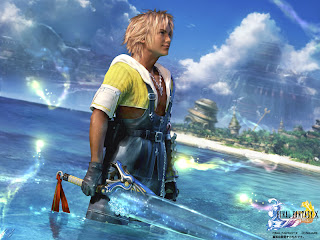Artist/Song: Bang Camaro - “Push Push” (Lady Lightning)
Game: Guitar Hero 2
 |
| "Trogdor" was another great bonus song from that game, but I was already aware of it at the time. |
I was first working at a video game store when I encountered the Guitar Hero games, and I was terrible at them. When Guitar Hero 2 was released, our store got a preview copy with a few songs for the in-store demo station. In times when business was slow, I played the hell out of those few songs, and ended up pre-ordering and purchasing the full game when it released for the Xbox 360. I carved through the catalogue of songs in that game bit by bit, unlocking all the bonus songs and being able to play almost every song on Hard. One of the more fun ones to learn was the Arena-rock styled song from Bang Camaro. I don't play much guitar hero these days, but I still listen to that song now and again.
Artist/Song: Louis Armstrong - “A Kiss to Build a Dream On...”
Game: Fallout 2
I'd heard of Satchmo before Fallout, of course, but in the same way I'd heard of Jelly Roll Morton, Bing Crosby, and other artists who I could name but didn't really “listen to.” The amazing opening for this game impressed me so much that not only did I reload it many times to watch again, but I eventually picked up a CD of Louis Armstrong's recordings from the Decca sessions. This CD is representative of a lot of the commonly recognized “greatest hits,” and though I've ripped it to individual MP3s by now, I can say that the gravelly voice and amazing trumpet skills of this musical titan are a major part of any shuffle rotation.
Artist/Song: Alizée “J'en ai Marre”
Game: World of Warcraft
 |
| Yep, that is a specific dance move from a specific singer. |
Funny thing about this one is, I didn't encounter French Pop star Alizée through her music, at least not initially. As people (or at least, most guys) who have played WoW for any significant length of time would likely recognize, the French pop singer is the inspiration for the female Night Elf dancing animation. In one of the many videos showing the WoW dances and their real-world counterparts side-by-side, I noticed this one and curiosity sent me to Google to find out who she was and what her music sounded like. Surprisingly, I found a few songs I liked quite a bit without any videos of her dancing required, even though I don't speak French near well enough to understand them.
Artist/Song: Poets of the Fall - “War” and “Poet and the Muse” (as Old Gods of Asgard)
Game: Alan Wake
I've mentioned these guys before. Since encountering their music in Alan Wake, the Finnish rock band Poets of the Fall has become one of my very favorite bands of all time. I haven't been to a concert in years, but if these guys have a tour that takes them anywhere near Chicago, I may have to clear my schedule and score tickets. They appear throughout the game both as themselves, and performing two songs as the fictional Nordic Metal Band from the 1970s called Old Gods of Asgard. (Video above is an "Old Gods" power ballad.) Most of their stuff sounds like a blend between Jethro Tull and Queensryche, clean vocals and dark undertones in the music. Outside of the songs from the games, I am a huge fan of both the newest album, Twilight Theater, and Carnival of Rust from 2006. They also wrote and performed the closing credits to Max Payne 2.
Artist/Song: Jonathan Coulton - “Still Alive”
Game: Portal
Even people who have never tried Portal have likely heard the closing credits song over and over again. The clever lyrics, darkly humorous and in keeping with the tone of the game itself plus the incredibly catchy tune got many geeks to play the song to death and memorize all the words. Mr. Coulton wrote the song, but didn't perform it himself. A little digging online reveals a career built on funny songs with geeky themes, from Zombie Office Workers trying calmly to draft a memo to get the humans to let them in (RE: Your Brains,) to a young nerd who dreams of the day in the future when he can become a cyborg supervillain with a lab in space, because he is humiliated by a girl he likes now (Future Soon.) I've heard most of his albums, and the songs are catchy, well performed and genuinely funny throughout, so long as your sense of humor is twisted.
There are scores of songs from the music games like Rock Band and Guitar Hero that I left off, mainly because most of my favorites from that genre are tunes I already knew about before the games featuring them. Also worth a brief mention is the track from Portal 2, “Exile Vilify” by The National. I played that song again and again to the point of my wife yelling at me right after hearing it. More than one of the Skateboarding games on consoles have had songs on their soundtracks that I've since tracked down, and the Grand Theft Auto series has great music on the various in-game radio stations as well.






